Call it what you want: Backyard Garden, Victory 2020 Garden, Stress-fighter Garden, Pizza Garden, My Secret Garden. It will still mean that along with all the great benefits it will also entail daily work, sweat, and scouting for diseases and insects. We are very fortunate here in Florida in that we can technically garden all year long. Just try to imagine going through this time of “working from home” up in snow country or with no green leaves on the trees.
Gardening used to be called America’s Pastime. However, the farther we got into the technological age, the more distant we became from any gardening knowledge we may once have had. And you may say to yourself: “It would have been nice to have a garden during this time period.” There is an old saying about the best time to plant a fruit tree is always “X” amount of years ago. Here in Florida there is always something we can plant and grow now.
Gardening as Stress Relief
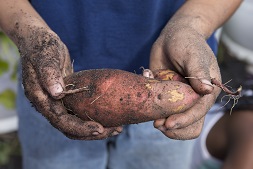
Gardening is a great way to relieve stress for ourselves and for the kids. Get the children out in the garden with you and keep it low-pressure. Their attention span is short, especially those under 6 years of age. But they will remember digging, getting dirty, watering and watching the vegetables grow with you. Have the older children read the seed packet label to you to see how deep the seeds need to be planted. They are much more likely to eat vegetables if they have had a part in growing them. Since they germinate so quickly, try green beans first. Incorporate the reading of the story of “Jack and the Beanstalk”. We painted a large plastic pot black. Then sponge-painted it in space-age swirls of deep purple, cobalt, and pink nebula desings, adding some glitter spray for stars like space. We then planted “royal purple pod” beans and watched them grow like Jack’s magic beans. Those purple pods are truly magical – they turn green once you cook them!
The 1st Florida Gardening Season – Winter:
Here in Florida we have more than one gardening season. For the winter season, planting begins in late August thru September. This is when we plant the vegetable seeds for crops that don’t like our summer heat. The following are just a few of the cool-season crops Floridians can grow through the winter months.

- Beefsteak tomato
- Broccoli
- Cabbage
- Radish
- Carrot
- Peas
- Kale
- Spinach
The 2nd Florida Gardening Season – Summer:
But right now, at the end of April and beginning of May, it is almost too late for our summer garden vegetables. The ideal time to plant our summer gardens is in March. Most of the following examples will be finished by mid June. But there are exceptions and it is still not too late. Examples of summer vegetables for Florida are:
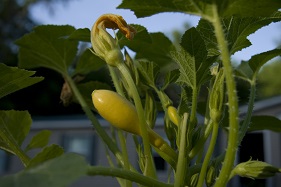
- Summer squash & zucchini
- Cherry tomato,”Sweet 100’s” or “Everglades”
- Okra
- Roselle, “Florida Cranberry”, Hibiscus sabdariffa
- Watermelon
- Cantaloupe
- Peppers
- Eggplant
- Beans (green, yellow, purple, or yard-long!)
- cucumbers
- Seminole pumpkin
- Sweet potato
- Lettuce- can take some shade
For information on exactly what varieties of vegetable do best in Florida gardens see the charts at the end of the UF/IFAS publication 3SP103: Florida Vegetable Gardening Guide
What About Perennial Gardening?
There are also perennial vegetables & fruits. These are edibles which grow year-round, no tilling or replanting. You might have to hunt for these at small plant sales, online growers, or through word-of-mouth. Ask around. But be careful as food allergies may occur with eating unfamiliar vegetables. Some examples of perennial vegetables for Florida are:
- Katuk- Sauropus androgynus- leaves are 49% protein!
- Okinawa Spinach, Gynura crepioides
- Longevity Spinach, Gynura procumbens
- Malabar spinach, Basella alba (green), Basella rubra (red)
- Tree Collards, Brassica oleracea var. longata
- Moringa tree, Moringa oleifera
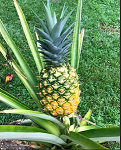
Perennial fruits may or may not be available at all times but the plant keeps on growing from year to year so it is considered perennial. And some of these are useful for fiber as well. Some examples of perennial fruits include:
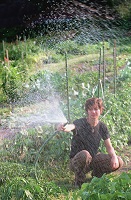
- Pineapple, Anana spp.
- Banana, Musa spp.
- Strawberry tree fruit, Panama berry, Muntingia calabura
- Acerola cherry, Barbados Cherry, Malpighia emarginata
- Natal Plum, Carissa
- Coconut, Cocos nucifera
- Star Fruit, Carambola
- Sugar Cane, Saccharum spp.
- Mulberry, “Black”, “Giant”, “Pakistan”, Malus spp. – “Everbearing” can have berries all the time
- Papaya, Carica papaya, is very easy to grow
Doing an internet search for terms like “Florida Gardening”, “Florida Permaculture”, “Florida Survival Gardening”, “Edible landscaping in Florida”, or “Florida Food Forests” will help you get started perennial gardening in Florida. Use a qualifier with your search terms such as “UF” or “EDU” to keep to research based articles instead of commercial web-pages.
The Plot Thickens
For your new garden, you will need to select a spot in full sun and close to a water source. Then prepare it for a vegetable garden plot before you start planting seeds. Whether you decide you’re going to plant raised beds, in pots, or just right in the ground there will be much preparation of the soil. Adding compost to our nutrient poor, sandy, Florida soil will build it up and help it retain some moisture.
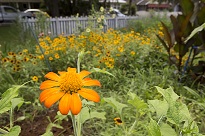
And don’t forget to add some flowers. Having flower blossoms close to your vegetables can benefit your garden in many ways. Flowers attract pollinators, such as bees and butterflies. They can trap harmful insects and nematodes. And they are just so cheery sitting in a vase on the kitchen table!
For more great and varied information on vegetable gardening in Florida from the University of Florida, please visit their Gardening Solutions website for a list of UF vegetable gardening publications, how-to’s, and videos by UF Extension Agent Emeritus Tom MacCubbin.
We also have a fine blog post on Nematodes: The Bane of the Florida Vegetable Gardener. by our Environmental Horticulture Agent, Nickie Munroe, who will show you just what to look out for in your tomato and pepper transplants.
 1
1
